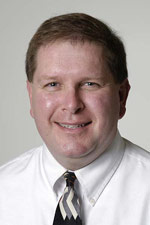Events of Sept. 11 have lasting influence
Like many Americans, Don Schutt watched the events of Sept. 11, 2001, in horror and thought about the ties he had New York City: family who lived near the Twin Towers, work he’d done with the city’s schools, students whose families had been affected.
But it was a connection to the World Trade Center almost a year later that continues to influence him and his work at UW–Madison.
Schutt, director of UW–Madison’s Office of Human Resource Development, was in New York in the summer of 2002 as one of 500 facilitators helping to foster a discussion among city residents about the future of the World Trade Center site.
“The reason I think I’m still touched by the experience is I will never forget the stories of the people around me at that table,” he says. “The dramatic impact it had. I wonder what they’re doing now. I wonder how they are and how they survived it.”
About 4,500 people participated in the discussion Schutt helped facilitate, which was also attended by top state and city officials, as well as New York’s business leaders, and which centered on a proposal for how to rebuild at the site.
Schutt remembers the raw, emotional reaction to the plans from the people at the table where he was leading the discussion. One person at the table was the leader of a local business association, while another was a woman whose husband used to work across the street from the World Trade Center but now refused to return to the area.
That emotional response to the strategy was an eye-opener for the World Trade Center planners, Schutt says.
“None of the plans they had found a positive response … it really caught them off guard,” he says. “What they ended up doing was redoing and reviewing what was most important and what the people from New York City thought should happen with that site.”
Schutt says he brought back to UW–Madison techniques learned from such a massive public dialogue, which have influenced discussions on campus — especially when decision-makers are confronted with a feeling that what they had planned isn’t acceptable to the community.
“Out of the tragedy there, even UW–Madison has come out of it with new ways of learning and considering how to look at different things,” Schutt says.
Tags: academic staff

